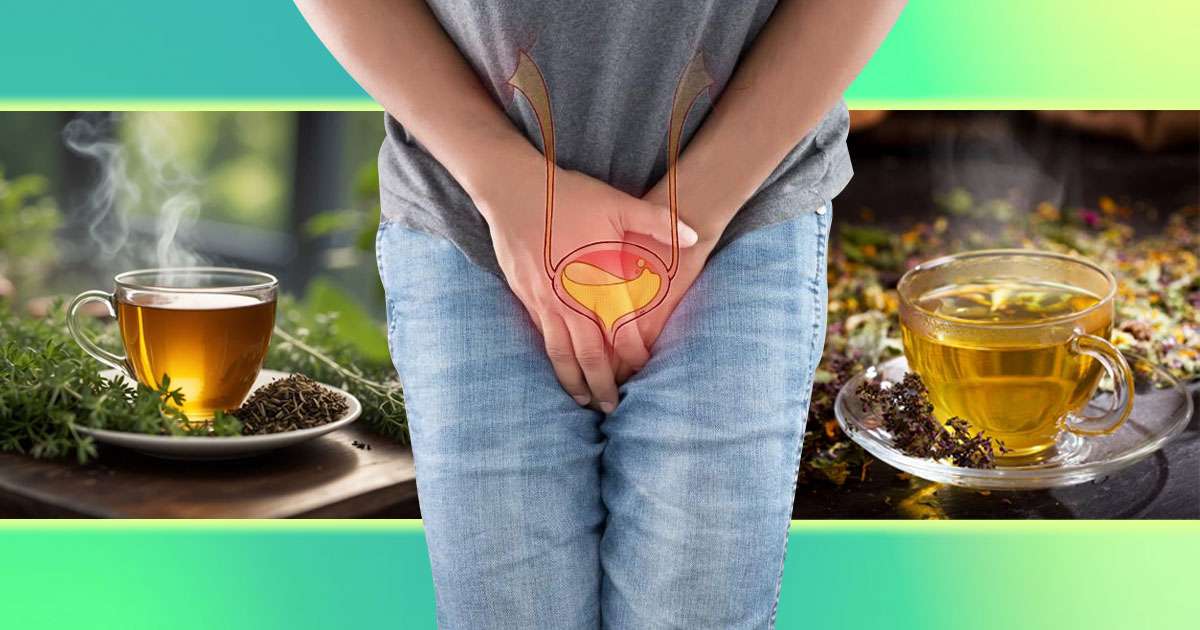Teas for a Happy Bladder: 10 Herbal Options for OAB

Lots of people are curious about using herbs for overactive bladders. The CDC says about 75% of people with this problem have tried some kind of natural treatment. Why? Maybe because their usual treatments don’t work well or have unpleasant side effects.
Certain herbal teas can help your bladder stay healthy and work properly by clearing out any bothersome stuff. Many herbal teas don’t have caffeine, so they might not upset your bladder or make you pee more. But watch out for teas like yerba mate—they have caffeine, which you might want to avoid.
10 Bladder-Friendly Herbal Teas for an Overactive Bladder
Here are some of the best herbal teas to help with leaks:
Gosha-jinki-gan
This special combination of 10 different herbs has been thoroughly researched, making it stand out among other products. Japanese scientists conducted a study where participants took this blend daily for 8 weeks and discovered they needed fewer trips to the bathroom. Further research shows that it not only reduces the urge to go but also offers support for those dealing with incontinence issues. This blend provides a natural solution for promoting bladder health and improving overall comfort.
Saw palmetto
In Europe, people rely on an extract derived from the berries of a small palm tree to tackle issues stemming from an enlarged prostate. Studies indicate that the elements found in saw palmetto may interact with the nerves in your urinary system, helping to alleviate Overactive Bladder (OAB) symptoms. This natural remedy offers potential relief for those experiencing discomfort due to prostate enlargement and urinary concerns.
Capsaicin
The fiery kick of chili peppers comes from this spicy element. Experts suggest it might work similarly to resiniferatoxin. A small study conducted in Thailand discovered that it can reduce bathroom visits and manage leaks. However, there’s a catch: it could lead to side effects such as discomfort and irritation. While it shows promise in addressing certain issues, it’s essential to be aware of potential drawbacks like these.
Ganoderma lucidum
This mushroom has been a key ingredient in Chinese medicine for over 2,000 years. According to a study from Japan, it was found to reduce the urge to urinate after 8 weeks of use. Medical experts believe it works by lowering levels of hormones that contribute to prostate growth, which is a common cause of Overactive Bladder (OAB) in men. This natural remedy offers potential relief for those dealing with urinary issues related to prostate health.
Resiniferatoxin
Crafted from a cactus-like plant found in Morocco, this remedy is famed for its fiery sensation akin to hot peppers. Scientists suggest it operates by blocking nerves in the bladder that signal to your brain the need to urinate. Additionally, it’s thought to increase bladder capacity, resulting in fewer restroom visits. This natural solution offers potential relief for those seeking to manage urinary urgency and frequency.
Horsetail
This plant, known for its long, tail-shaped appearance, belongs to the fern family and thrives in swampy areas, marshes, and near rivers. Packed with antioxidants, it’s believed to shield against the wear and tear that comes with getting older. According to experts, bladder tissue can deteriorate and become fibrous over time. Horsetail has been suggested to possibly halt or even reverse this decline, though scientific evidence supporting this notion or its effectiveness in managing Overactive Bladder (OAB) is limited. While it holds promise, more research is needed to validate its potential benefits for bladder health.
Corn silk
While these thin strands might annoy you while shucking corn, they’re actually loaded with essential vitamins and antioxidants. Interestingly, they’ve been utilized for centuries in treating urinary tract infections. In more recent times, they’ve emerged as a potential remedy for Overactive Bladder (OAB). However, there’s a lack of research indicating their effectiveness in this regard. Despite their historical use and growing popularity in OAB treatment, their true impact remains uncertain.
Green tea
Research has looked into how drinking green tea can help with incontinence, and it seems like it could be good for your bladder. But it’s important to know that green tea has caffeine, so it’s best to drink it in moderation to avoid any negative effects. It’s because green tea can irritate your bladder. Fortunately, you can opt for bladder-friendly drinks instead.
Buchu (Barosma betulina)
Discovered in the South African mountains, this blooming plant has been used as medicine since the 1650s. It’s been known to help with various ailments like coughs, kidney infections, stomachaches, and even Overactive Bladder (OAB).
Cleavers
Due to tiny, adhesive hooks on its leaves, this herb is commonly brewed into a tea to address urinary tract infections. While there’s no specific research on its effects on Overactive Bladder (OAB), according to experts, many individuals believe it could offer relief by calming the bladder.
Choose the Best Tea for Optimal Bladder Health
Consider exploring bladder-friendly herbal teas that could potentially ease symptoms and promote bladder health. From traditional remedies like saw palmetto and horsetail to lesser-known options like resiniferatoxin and ganoderma lucidum, there’s a variety of natural solutions worth exploring. Remember to approach with caution and consult with a healthcare professional before incorporating any new remedies into your routine, especially if you have underlying health conditions or are taking medications.

